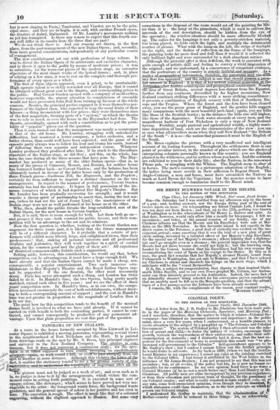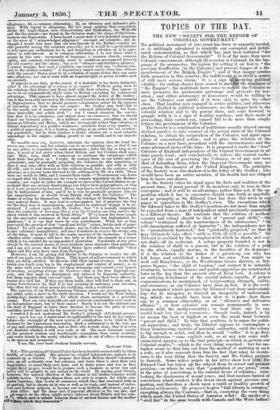COLONIAL POLICY.
TO THE EDITOR OF THE SPECTATOR.
lic in the _pages of the Horning Chronicle, Spectator, and Horning foal; and I conclude therefore, that the matter to which it relates—Colonial Go- vemment—has'obtained an increased interest and importance in the public mind, since a very few Tears, when I endeavoured, as a humble pioneer, to Leasow Castle, 30th December 1849. Sut—A letter from Mr. J. R. Godley to Mr. Gladstone has been maderb- excite attention to the subject by a pamphlet on u The Colonies and Colonial Government." The system of Colonial policy I then advocated was the rela- tion of parent and child,—to foster the infancy of colonies, encourage their growth, restrain the waywardness of their adolescence, and suffer their self- emancipation at maturity ; and I distinctly laid it down, that the best ex- pedient for the Government at home to accomplish this result was " to give increased self-government to the Colonies." Self-governinent appears to be Mr. Godley's new ' • but I confess I cannot follow out the further principle• he would desire to advocate. As far buck as 1839,. (when we had the best Co- lonial Minister in my experience,) I raised my voice at the tutelage exercised by the Colonial Office. I had found it attributed in the West Indies to the influence of Sir James Stephen : I am not prepared to say that this was not prejudice ; but, at all events, if the policy was his, he is now no longer re- bponsible for its continuance. In my own opinion, Lord Grey is no worse a Colonial Minister (if he be not a much better one) than Lord Stanley or Mr. Gladstone. All public men are alike incompetent by any previous experience, or from their education and previous train of thought, for the presidency of our Colonial empire ; and what is really required is some explicit code, or, any rate, some well-enunciated opinions, even though they be dissident, which statesmen could class themselves, es to the hest principle on which govern our Colonial empire. I understand Mr. Godley to maintain, that the administration of Mother-country should be-reduced to three things : 1st, an acknowledg allegiance ; 2d, a common citizenship; 34I, an offensive and defensive alli- ance. With regard to allegiance, the two great opinions that everywhere divide the Anglo-Saxon race—Conserratisin and Radicalism, the Well-offii and the Go-aheads—are found in the Colonies tinder the shape of Old-Coun- trymen and Separatists. I have heard a great deal of very heretical language on the score of " acknowledged allegiance" amongst our colonists ; and al- though I would fain hope that old attachments to the Mother-country are still powerful among the colonists generally, yet it would be a great mistake to rely- upon any enthusiasm for it, and dangerous to calculate on it in oppo- sition to self-interest. As to common citizenship, I do not know what it means in this case : community of language, a common church, common rights, and common relationship, must be conditions presupposed between the old country and the colony ; but as to "offensive and defensive alliance," I cannot imagine how such a condition can coexist with any " colOnial rela- tion to the mother-country." A dependency cannot surely enter into alliance with the parent ! States must be in a relation of equals before they can enter into alliances; nor can it exist with an imperial right or power to suffer such an anomaly. It appears to me that, at the outset, it is desirable to lay down distinctly, what is the advantage of a colony to an empire? Without going back to the relations that Greece and Rome held with their colonies, they appear to me to be of comparatively slight value to Britain excepting for commercial advantage. This appears to have almost escaped' the notice of Mr. Godley but it has been ably asserted in Mr. Cornewall Lewis's book on the Government of Dependencies, that we should promote colonization rather for the purpose of extending our trade than our empire. Mr. Godley may hold this to be the result, not of matured wisdom or enlarged philanthropy, but luxu- rious imbecility and selfish sloth " ; but I cannot abandon the convic- tion that it is on commerce, and almost alone on commerce, that we should found our Colonial policy. As a military excrescence, (excepting in such places as Gibralte and Blithe, which are strongholds rather than colonies,) a distant dependency is a positive wealmess; assailable from every quarter: as a political appendage, it is a burden, excepting as an outlet for our overflow- ing population ; but m their relation to trade, colonies are a most valuable appendage to the empire ; adding greatly to our wealth and to our import- ance.
No sensible man can, however, entertain the opinion that the bond be- tween any country and her colonies can be an everlasting one or that it can by any policy or expedient be made permanent ; defer the day long as we may, it must at last arrive when Great Britain and her Colonies shall sepa- rate. How, then, shall we endeavour to continue the advantages which their trade has given us ? I reply, By rearing them in our habits and re- quirements, and by gradually preparing the Colonies for this separation, so that it may take effect with as little collision as.possible, and with as little ill-will ; and to look forward to this without dread, but on the contrary with pleasure, as a parent looks forward to the settlementin I& of a child. These were my words in 1845, and I reassert their truth—"Nostatesman can desire or expect that the Colonies are for ever to remain dependent on the Mother- country ; nor ought we (after the example we haveof the United States) to ap- prehend that any serious disadvantage can follow their independence, so long as it is not prematurely hastened. Every man knows well that his son must one day be independent of him, and if he is wise he gradually prepares him for his emancipation : so should Great Britain deal with her Colonies." The desire of acting for themselves, without the tutelage of Downing Street, is a ' very natural desire. It may lead to extravagance, but it prepares the way for the final step of emancipation, and should be pardoned though. it be re- strained. I cannot agree with Mr. Godley, that it is morally impossible that the authority of Downing Street over the Colonies can long survive the shock which it has received in South Africa." If " a lesson has been taught by the successful resistance of that small and feeble but highminded de- pendency," it is Vine that bears its own punishment. What has so long prevented the growth of that "small and feeble "colony, but its lack of popu- lation ? Its arid and unprofitable plains, and its Caffre inroads, are repulsive to any voluntary immigration; and since it disdains to receive the strong arm of the felon, it mutt be left to the tender mercies of the barbarian. I doubt whether other colonies will have the folly to follow its example in a course which is too suicidal for an unpopulated plantation. Population at any price should be the natural desire of every territory more extensive than populous ; and I am not aware that the United States have suffered although "their Adam and Eve may have come from Newgate." However, I am for giving full liberty to the Colonies to receive the off- sets of our gaols or to decline them. This is part of self-government to which they are fairly entitled. So likewise with their inland revenue. As the first lesson you teach your boy is the employment and control of money, so do the same with your Colonies : let them determine and control every branch of revenue, excepting always- the 0(6N/us—that is the tree Imperial con- cern and that must be determined and enforced by Imperial authority. Let ihem regulate their internal trade. Let them pay their local teems by means of a civil list. If they pay them badly, they will find to their cost, as young housekeepers do, that it is bad economy to underpay your servants, who often find out other moans for rectifying such a weakness. -The junction of our North American Colonies under one government is, to i my-mnd, quite a move in the right direction. I would see the West Indian Arch ipelag0 similarly 'united; for which steam navigation is a powerful means. How can such insignificant and scattered communities ever exist as an independent state, but by their union ? Surely it is not the interest nor the duty of England to leave them freedom to become the prize of every maritime power that can for the moment sweep the seas.
-I oonfess I do not understand Mr. Godley's principle of Colonial govern- ment ; much less can I understand its applicabilityto the task he has under- taken—the oversight of the new system of colonization to be tried in New Zealand by the Canterbury Association. Such a settlement is in the very age (
of pap .41 swaddling-clothes, and so little able to walk alone, that it is even yet doubtful whether it will ever walk at all. The most fortunate results of the greatest wisdom and forethought--exemption from every accident, and every friend in the world, whether in office or out of office—is necessary to iiis success and prosperity.
I am, Sir, your most obedient humble servant,
EDWARD CUST.
T.S.—The question of Colonial Policy has been treated commercially by Adam summed up as follows. " To propose that Great Britain should voluntarily Smith, at some length. His opinion on colonial independence appears to he
ro I give up all authority over her colonies, and leave them to elect their own , magistrates, to enact their own laws, and to make peace and war as they ' might think proper, would be to propose such a measure as never was and never will be adopted by any nation in the world. By parting good friends, however, the natural refection of the colonies to the mother-country would quickly revive. It might dispose them not only to respect, for whole cen- turies together, that treaty of commerce which they had concluded with us at parting, but to favour us in war as well as in trade, and instead of turbu- lent and factious subjects, to become our most faithful, affectionate, and ge- 1 tons allies : and the same sort of parental affection on the one side, and t, -Al respect on the other might revive between Great Britain and her cola- "' -1- I, which used to subsist between those of ancient Greece and the mother































 Previous page
Previous page